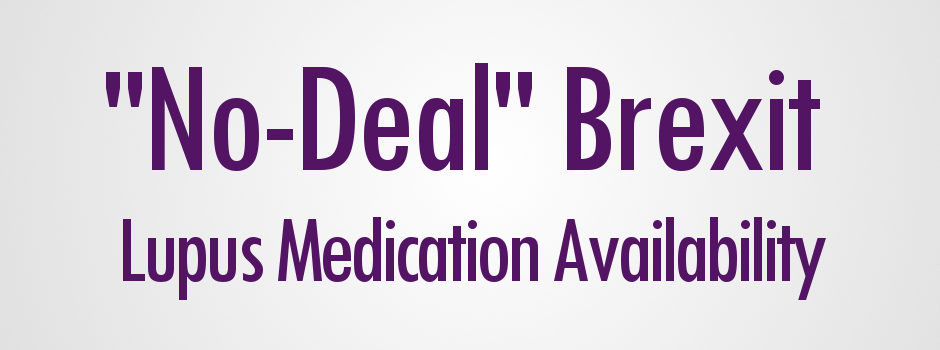
Lupus Medication Availability in a “No-Deal” Brexit
 September 16th, 2019
September 16th, 2019 Nakita Cambow
Nakita Cambow Latest News
Latest News 0 Comments
0 Comments
 In this article we’ll try to explain what a “no-deal” Brexit might mean in the short-term for people with lupus (and its associated conditions) accessing medication. The information below should be read alongside the official advice and frequently asked questions on NHS England’s website.
In this article we’ll try to explain what a “no-deal” Brexit might mean in the short-term for people with lupus (and its associated conditions) accessing medication. The information below should be read alongside the official advice and frequently asked questions on NHS England’s website.
A “no-deal” Brexit would bring a series of changes to the relationship between the UK and the EU. In this article we are only focusing on access to medicines. There is a lot of uncertainty around Brexit and therefore we may not be able to satisfactorily answer every question you may have at this time.
What impact could a “no-deal” Brexit have for people with lupus?
It is very difficult to predict exactly what might happen to health and care services used by people with lupus and associated conditions if the UK leaves the EU without a deal. However, the Government, the Department for Health and Social Care and the NHS have been working with drug and medical device manufacturers to put in place plans so that supplies of medicines are stockpiled in the short term.
We are aware that this has included seeking advice from companies that manufacture drugs for lupus. The Department for Health and Social Care (DSHC) has established a ‘hotline’ for suppliers to the NHS to use if they experience any disruption to deliveries as a result of Brexit, and they are also working with their counterparts in Scotland, Wales and Northern Ireland to support them in any preparations.
Do I need to stock-up on any medication I’m taking, or ask for my prescription to be changed?
 The Government has made it clear that it does not recommend people to keep stocks of medication, and it has issued advice on this to the NHS and other healthcare providers. The majority of drug suppliers have put in place contingency plans to ensure at least a six week supply, as requested by the Government, with many holding stocks for a much longer period. The NHS in Scotland has also set up a specialist group to look at any potential medicine shortages resulting from a “no-deal” Brexit.
The Government has made it clear that it does not recommend people to keep stocks of medication, and it has issued advice on this to the NHS and other healthcare providers. The majority of drug suppliers have put in place contingency plans to ensure at least a six week supply, as requested by the Government, with many holding stocks for a much longer period. The NHS in Scotland has also set up a specialist group to look at any potential medicine shortages resulting from a “no-deal” Brexit.
If your pharmacist is unable to provide the medication you have prescribed, they may suggest an alternative or ask you to see your GP to have your prescription changed. If there’s anything you’d like to know about changes to your medication, it is important you speak to your GP or healthcare professional in charge of your care.
If there’s a “no-deal” Brexit will I be able to get the medication I need for my lupus if I go on holiday to the EU?
 Some EU countries, such as Spain, have already said they will allow UK nationals to keep access to healthcare even if there is a “no-deal Brexit”. The Government has also said it will fund, for up to one year, healthcare for UK nationals who have applied for, or are undergoing treatment in the EU before Brexit.
Some EU countries, such as Spain, have already said they will allow UK nationals to keep access to healthcare even if there is a “no-deal Brexit”. The Government has also said it will fund, for up to one year, healthcare for UK nationals who have applied for, or are undergoing treatment in the EU before Brexit.
However, the Government has also made it clear that it may not be able to guarantee access to healthcare abroad in a “no-deal” scenario, and continues to advise UK residents to take out travel insurance for any overseas travel. Similarly, having the European Health Insurance Card (EHIC) may no longer guarantee that other EU countries will cover any healthcare costs; therefore the above advice also applies.
LUPUS UK echo the Government’s advice related to travel insurance and have a list of companies who cover people with pre-existing health conditions HERE. We recommend you speak to your GP or healthcare team for their advice on any health-related preparations you may need to make when going on holiday.
It is important to note that there is no insurance available for dialysis treatment, which is currently covered through European Health Insurance Card (EHIC) arrangements. In the case of a “no-deal” Brexit, if no reciprocal healthcare deals are made with EU countries then UK dialysis patients will not be able to travel in Europe unless they pay approximately £300 per session. Kidney Care UK and the University of Sheffield have published a report outlining the impact a “no-deal” Brexit could have on dialysis care for kidney patients visiting EU countries – HERE.
What next?
In the short term, it is very difficult to fully understand the potential impact of a possible “no-deal” Brexit and how it might affect the availability of medicines. However, we will continue to monitor the ongoing situation to ensure that the needs of people with lupus are considered and we will update our information and advice accordingly.
If you have any questions that are not answered here, please contact us and we will do our best to be of assistance.
Published 16/09/2019



 ©2024 LUPUS UK (Registered charity no. 1200671)
©2024 LUPUS UK (Registered charity no. 1200671)